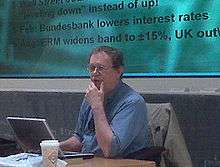Harry Cleaver
| Harry Cleaver Jr. | |
|---|---|
 Cleaver lecturing at the University of Texas at Austin | |
| Born | January 21, 1944[1] |
| Nationality | American |
| Occupation | Professor emeritus[2] |
| Academic background | |
| Education | Ph.D. |
| Alma mater | Stanford University[3] |
| Thesis title | The Origins of the Green Revolution[4] |
| Thesis year | 1975 |
| Doctoral advisor | John G. Gurley[4] |
| Academic work | |
| Discipline | Economics |
| Sub discipline | Marxian economics, Autonomist Marxism |
| Institutions | University of Texas, Austin, The New School[3] |
| Notable works | Reading Capital Politically |
Harry Cleaver Jr. (21 January 1944) is an American scholar, Marxist theoretician, and professor emeritus at the University of Texas at Austin. He is best known as the author of Reading Capital Politically, an autonomist reading of Karl Marx's Capital. Cleaver is currently active in the Zapatista movement in Chiapas, Mexico.[3]
Education
Cleaver began his undergraduate studies at Antioch College in 1962, graduating with a bachelor's degree in economics in 1967. At Antioch, Cleaver became involved in the American Civil Rights Movement and began his lifelong engagement with political activism.[3] From 1964-965, Cleaver studied abroad at the University of Montpellier where he engaged with the Union Nationale des Étudiants de France. In 1967, Cleaver enrolled at Stanford University to begin a Ph.D. in economics. While at Stanford, Cleaver was active in the Anti-war Movement. As a student activist opposed to the Vietnam War, Cleaver protested the Stanford Research Institute's alleged connection to the United States Department of Defense, which became the impetus for his dissertation research into the connections between the Green Revolution and social engineering.[5][6] Cleaver's frustrations with mainstream economic theory during this period in his studies lead him to embrace Marxism.[3]
Career
Teaching
In 1971, Cleaver was hired as an assistant professor at the Université de Sherbrooke in Montreal, Quebec where he taught for three years, finished his dissertation, and studied Québécois nationalism. From 1974 to 1976, Cleaver was a visiting assistant professor at the New School for Social Research in the department of economics. In 1976, Cleaver took a position in the economics department of the University of Texas at Austin where he would teach for 36 years, retiring in 2012.[7]
Partial bibliography
| Library resources about Harry Cleaver |
| By Harry Cleaver |
|---|
Books
- Cleaver, Harry (2016). Rupturing the Dialectic: The Struggle Against Work. Chico: AK Press. ISBN 1849352275.
- Cleaver, Harry (1979). Reading Capital Politically. Austin: University of Texas Press. ISBN 0292770154.
Articles
- Cleaver, Harry (1998). "The Zapatista Effect: The Internet and the Rise of an Alternative Political Fabric". Journal of International Affairs. Journal of International Affairs Editorial Board. 51 (2): 621–640. JSTOR 24357524.
- Cleaver, Harry (1996). "The "space" of cyberspace: Body politics, frontiers and enclosures". Women & Performance: a journal of feminist theory. Taylor & Francis. 9 (1): 239–247. Retrieved 8 June 2016.
- Cleaver, Harry (1994). "Kropotkin, Self-valorization And The Crisis Of Marxism" (PDF). Anarchist Studies. Lawrence and Wishart (2): 119–135. Retrieved 8 June 2016.
- Cleaver, Harry (1989). "Close the IMF, abolish debt and end development: a class analysis of the international debt crisis". Capital & Class. Sage Journals. 13 (3): 17–50. Retrieved 8 June 2016.
- Bell, Peter; Cleaver, Harry (1989). "Marx's crisis theory as a theory of class struggle". Research in Political Economy. Emerald Group Publishing. 5 (5): 189–261.
- Cleaver, Harry (1977). "Malaria, the Politics of Public Health and the International Crisis". Review of Radical Political Economics. Sage Journals. 9 (1): 81–103. Retrieved 8 June 2016.
- Cleaver, Harry (September 4, 1976). "Political Economy of Malaria De-Control". Economic and Political Weekly. Economic and Political Weekly. 11 (36): 1463–1473. JSTOR 4364910.
- Cleaver, Harry (March 27, 1976). "Internationalisation of Capital and Mode of Production in Agriculture". Economic and Political Weekly. Economic and Political Weekly. 11 (13): A2–A5+A7–A16. JSTOR 4364488.
- Cleaver, Harry (1972). "The Contradictions of the Green Revolution". The American Economic Review. American Economic Association. 62 (1/2): 177–186. JSTOR 1821541.
References
- ↑ Cleaver, Harry (May 2009). "Curriculum Vitae for Harry Cleaver". Harry Cleaver Homepage. Retrieved June 6, 2016.
- ↑ "Faculty Bio - Harry Cleaver Jr.". The University of Texas at Austin - College of Liberal Arts. Retrieved June 6, 2016.
- 1 2 3 4 5 Cleaver, Harry. "Policy Activism". Harry Cleaver Homepage. Retrieved June 6, 2016.
- 1 2 Cleaver, Harry McBeath Jr. (1975). The Origins of the Green Revolution (Dissertation). ProQuest Dissertations Publishing. Retrieved September 9, 2016.
- ↑ Cleaver, Harry. "Research". Harry Cleaver Homepage. Retrieved June 8, 2016.
- ↑ Cleaver, Harry (March 1, 1972). "The Contradictions of the Green Revolution". The American Economic Review. American Economic Association. 62 (1/2): 177–186. JSTOR 1821541.
- ↑ Cleaver, Harry. "Teaching". Harry Cleaver Homepage. Retrieved June 8, 2016.
External links
- Harry Cleaver's personal website
- aut-op-sy email list
- Harry Cleaver at libcom.org
- Harry Cleaver Study Guide to Marx's Capital Volume 1
- Reading Capital Politically by Harry Cleaver